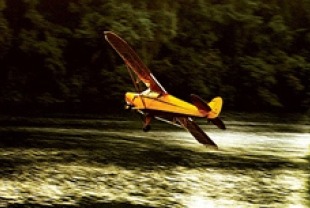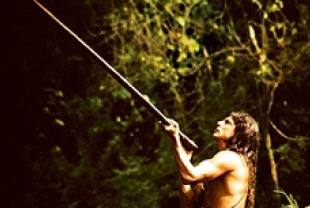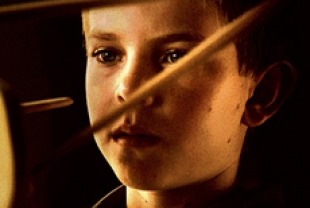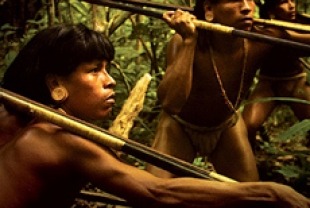During his short time on Earth, Jesus of Nazareth modeled what Christian author John Dear calls the revolutionary face of the God of nonviolence. Unfortunately, Jesus' moral imperative to love our enemies has not been accepted by many Christians and non-Christians alike and resistance to it has grown since 9/11. Still the way of not killing is central to the Gospel message. Nonviolence is more than an attitude or an ideal; it is a new way of being based on love and compassion for all. The old law of an eye for an eye leads only to an endless cycle of violence and destruction. It creates hatred, leaves new victims, and wreaks havoc on whole communities.
It has been a long time since we have had a film that boldly and courageously celebrates nonviolence as a core belief in the lives of Christians. End of the Spear bills itself as "a true story of adventure, tragedy, and a new beginning." That it is and much more. The story recounts the murder of five American missionaries in the Ecuadorian jungles of the Amazon in January 1956. Some readers may remember the extensive coverage of this startling event in Life magazine, which contained pictures in a ten-page spread. Prior to shooting this film, writer and director Jim Hanon went to live among the Waodani, the tribe involved in the incident, and made a documentary about them titled Beyond the Gates. It provides invaluable background material on the missionaries and the indigenous peoples they made contact with.
The Waodani people live in the Amazonian jungle, a world of incredible natural beauty which they believe is inhabited by a spirits. But they are a violent people who practice tribal revenge; sons are responsible for avenging the deaths of their speared fathers. This tradition has brought the tribe to the edge of extinction. One of their leaders is Mincayani (Louis Leonardo). He was just a boy when his village was attacked by a rival tribe led by Moipa (Gil Birmingham). He fled into the jungle with Dayumae, a young girl. Coming upon a band of whites, she decides to go with them and is never seen again. Years later when he is a warrior, Mincayani believes that violence keeps him strong and the worst thing in the world is to appear weak and undecisive. He eventually avenges the deaths of his family by leading a group of Waodani warriors to Moipa's camp.
Meanwhile, in 1956 Nate Saint (Chad Allen) lives along the Amazon with his wife (Cara Stoner) and young son Steve (Chase Ellison). He is a pilot and an ardent Christian who wants to locate the mysterious Waodani tribe and give them a message about nonviolence so they can be freed from the prison of their practice of revenge. He also fears for the tribe's survival since they are killing so many people, the government is threatening to bring in troops and wipe them out.
Their best friends are all missionaries from America: Jim Elliot (Sean McGowan), Pete Fleming (Matt Lutz), Ed McCully (Stephen Caudill), and Roger Youderian (Patrick Zeller). While flying over the jungle in his plane, Nate spots the Waodoni camp and is determined to make contact with them. His son, who is afraid of losing his father, wants to be reassured that he will use his gun to defend himself if attacked. Nate replies: "We can't shoot the Waodoni. They are not ready for Heaven. We are." This answer does not give the boy much consolation but it sums up the ardor of his dad's faith and his belief in nonviolence.
Nate begins regular flights around the Waodoni village. Micayani and his people do not know what to make of the large wood bee they see in the sky. The missionaries start by offering gifts in a bucket suspended from the plane. When they land on a sandbar in the river, they try their best to appear friendly and peaceful. But they don't know enough of the Waodoni language to communicate with the Indians. Micayani thinks they are cannibals and remembering the disappearance of Dayumae does not trust these white men. After two members of his tribe lie about what happened to Dayumae, Micayani and his men spear the missionaries.
Time passes, and Dayumae's sister arrives at the white settlement looking for her. It turns out that she is alive and has been raised by little Steve's aunt Rachel Saint (Sara Kathryn Bakker) who speaks Waodoni. Dayumae (Christina Souza) and some of the missionary wives decide to make contact with the tribe and see if they can live among them, which was the original plan of their slain husbands. Although Micayani is convinced that Dayumae is a spirit, Kimo (Jack Guzman), one of his warriors, accepts the message of nonviolence brought by these women: they follow the "carvings" about a God who had a son who was speared but he didn't spear back so that the people who speared him would live well.
Soon young Steve and his mother join the others at the Waodoni camp. The Christians prove to be especially helpful when members of another tribe fall sick with polio. The women and Kimo set up a make-shift hospital and compassionately look after these rainforest Indians.
The last segment of End of the Spear takes place when Steve Saint, now an adult living in the United States, returns to Ecuador for the funeral of his aunt Rachel, who had continued to live with the Waodani. The Indians now ask Steve to carry on the work of his father and aunt. What follows takes place at the site where his father was killed 40 years earlier. It equals the powerful scene of forgiveness in The Mission. It is an emotional sunburst that lifts up in a convincing and salutary way the startling power of the Gospel's message of reconciliation.
It is not easy to walk the talk of Christian nonviolence, especially when facing an enemy who has done us great harm. But this is what Jesus preached, and grounded in great love and courage, it brings out the very best that is in us. Hats off to this soul-stirring film for making that so clear!




